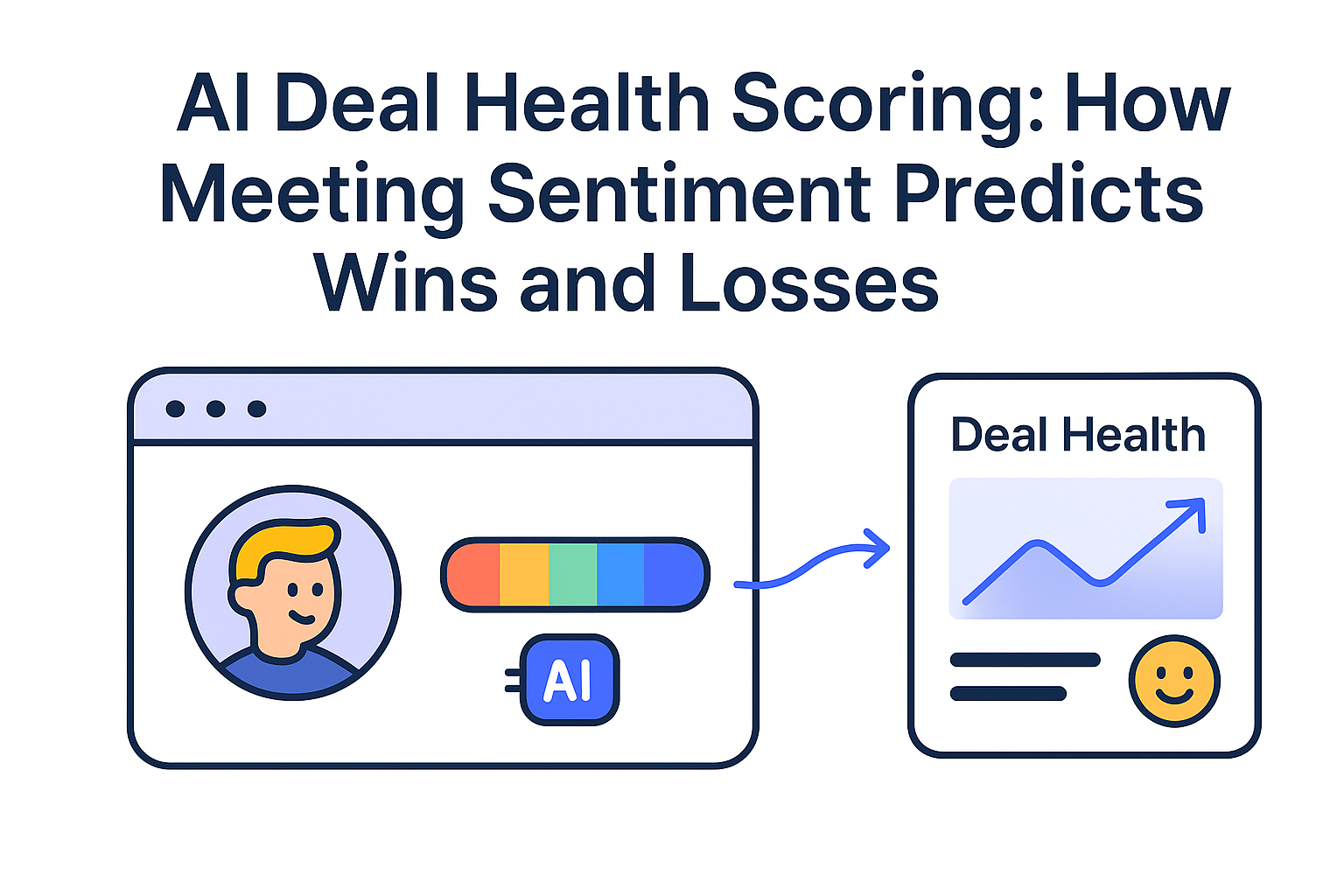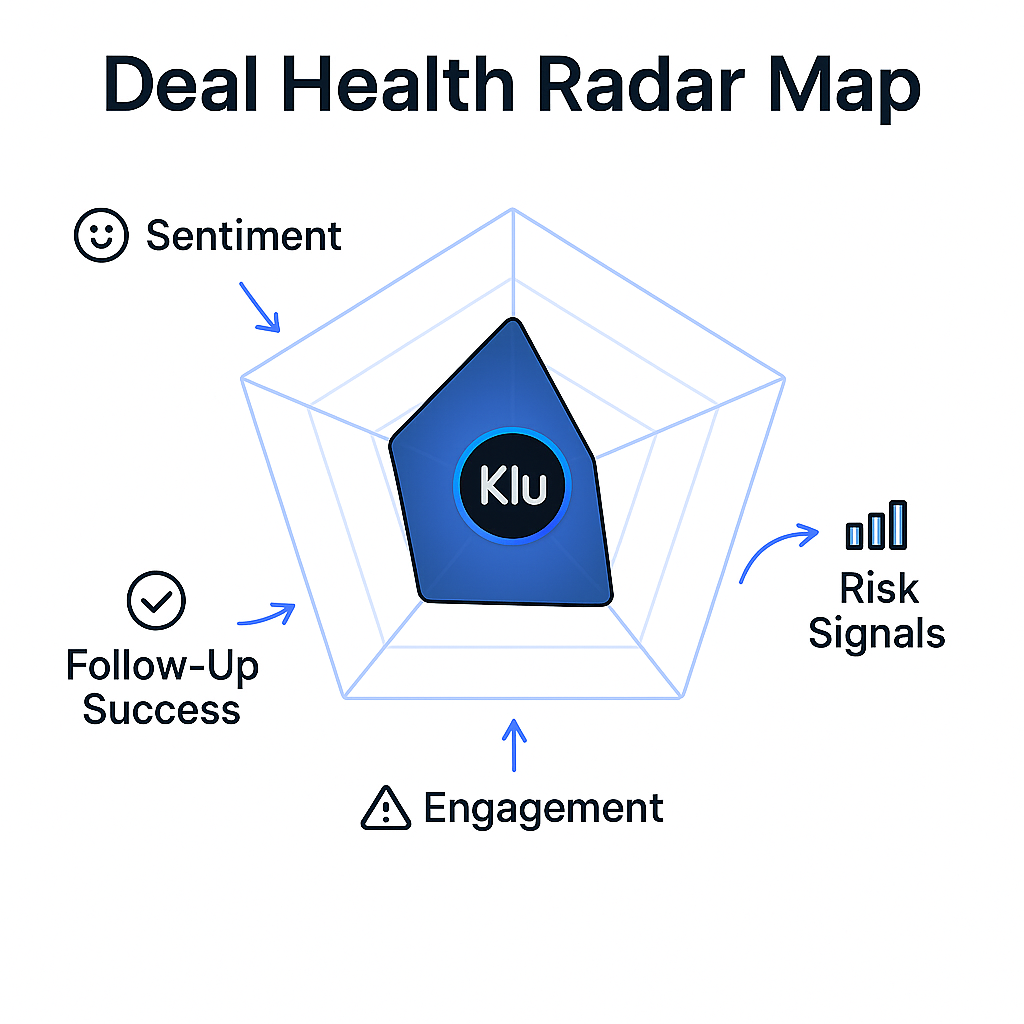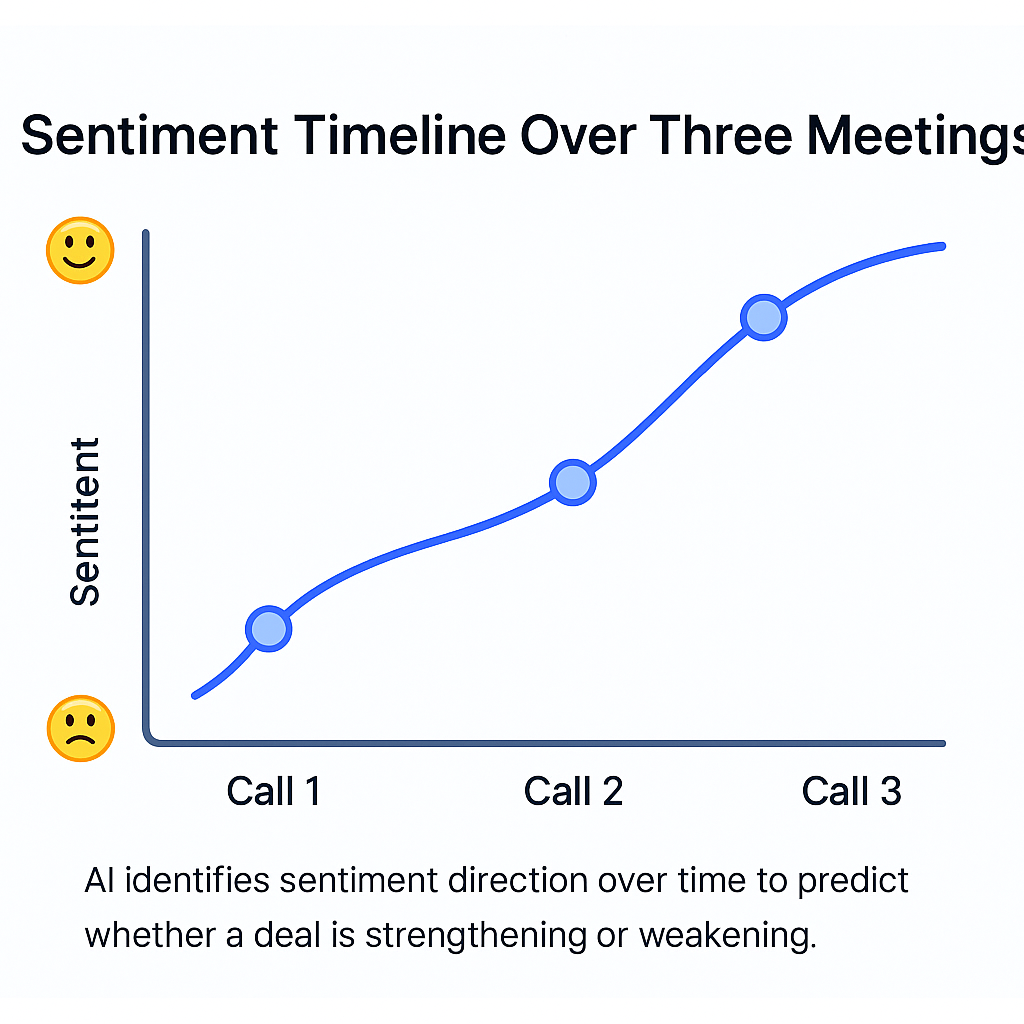 Sami AZ
Sami AZ
Revenue teams lose deals long before the CRM ever shows a red flag.
A frustrated tone in a discovery call.
A sudden drop in participation during a demo.
A confused response after explaining pricing.
A competitor mentioned twice in one meeting.
A champion losing influence in their company.
Sales reps notice these patterns instinctively, yet most of those signals never get documented. Managers and revenue leaders only discover problems later when the deal stalls, meetings slow down, or the customer picks another vendor.
This is where AI deal health scoring changes everything. Instead of relying only on CRM fields filled manually, AI evaluates meeting sentiment, intent signals, participation patterns, follow up consistency, action items, and communication tone.
The result is a score that reflects reality, not wishful pipeline forecasting.
In this article, you will learn:
And much more.
This is the future of revenue intelligence built not on spreadsheets or manual notes, but on what actually happened in the conversation. To see how sales teams already benefit from AI driven meeting automation, explore AI for Sales Teams.
AI deal health scoring is the process of evaluating the probability of closing a deal based on patterns found in meeting conversations, sentiment signals, buyer engagement, follow up behavior, and historical win and loss data.
A deal health score is a single number that represents risk and momentum. Instead of describing how a deal should behave, it reflects what is actually happening.
Traditional deal scoring relies heavily on:
But AI deal health scoring uses:
This produces a far more accurate score because it is based on real behavior and not just what gets typed into a CRM under time pressure.
Meeting sentiment is one of the strongest indicators of deal direction.
It is not about whether a customer sounds happy or sad. It is about the relationship between tone, engagement, intent, and clarity of the buyer at each stage.
Here are patterns AI can detect automatically:
In traditional sales approaches, these patterns often appear only in the rep’s memory or personal notes. They rarely reach the manager.
AI deal health scoring ensures these signals get captured and quantified.
While other platforms depend heavily on transcription, Klu focuses on the full meeting context:
Klu uses these signals to evaluate deal direction with more accuracy than any manual process.
Klu is designed for workflow automation and real life sales execution. This is why it connects meeting intelligence directly with actions. For a deeper breakdown of how automated follow ups work inside real sales funnels, read AI Follow Up Automation.

1. Buyer engagement score
How much the buyer talks and the quality of their participation.
2. Sentiment score
Tone and emotional signals across the meeting.
3. Follow up success score
Whether the rep delivers on commitments.
4. Objection score
Number and type of objections, especially recurring ones.
5. Risk signal score
Competitive threat, misalignment, budget uncertainty, or confusion.
6. Meeting trajectory score
Whether sentiment improves or declines across multiple calls.
7. Relationship strength score
Consistency of champion involvement and clarity of collaboration.
These combine to form a final deal health score inside Klu.
If your company uses HubSpot, Pipedrive, or Attio, this score can sync directly into the CRM to help sales managers prioritize pipeline risks.
For example, your team can pair this article with:
These provide deeper workflows that complement deal health scoring perfectly.
There are many tools that create transcripts. Very few create real intelligence.
A transcript by itself is just a large block of unstructured text. It lacks:
This is why Klu focuses heavily on structured notes and action items rather than raw transcripts.
A transcript may show words spoken, but it cannot show whether the buyer was excited or skeptical. Nor can it show whether the rep delivered on follow ups, or whether the deal is gaining or losing momentum.
Klu produces structured meeting intelligence automatically, which makes deal scoring accurate and timely.

Below are real examples of what AI sees that humans usually miss.
A prospect is enthusiastic during the first half of the call.
Tone drops by twenty five percent once pricing is shown.
Questions turn short and defensive.
AI labels the deal as medium risk and notifies the rep:
“Buyer tone declined significantly during pricing. Consider reframing ROI or offering tiered options.”
Meeting one: champion is engaged, positive, and aligned.
Meeting two: champion sounds distracted and less confident.
Participation drops by forty percent.
AI flags it:
“Champion involvement declined. Possible internal pressure or decision shift.”
Competitor shows up in two consecutive meetings.
Sentiment shifts toward comparison.
AI flags it:
“Competitive risk detected. Consider reinforcing differentiation.”
Rep commits to send case studies by next morning.
AI tracks follow up.
Deadline passes without delivery.
Deal health score drops because lack of follow up signals low rep reliability.
Meeting one: neutral sentiment.
Meeting two: strong curiosity and engagement.
Meeting three: positive tone and long exploratory questions.
AI boosts deal score automatically.
Sales managers can now see what they previously had no visibility into.
Instead of hearing “the deal went dark,” managers see declining sentiment days or weeks earlier.
Managers know exactly:
You can pair these insights with structured note syncing covered in CRM Note Automation article.
Managers see which deals are healthy even if the rep is new or uncertain.
Instead of asking “How is the deal going,” managers open the deal intelligence summary:
No more relying on rep optimism.
AI shows the real probability in clear terms.
This article is also relevant for your internal content cluster on customer success.
Customer success teams benefit from deal scoring in renewal cycles:
Meeting sentiment shifts long before customers cancel.
AI can track frustration patterns not explicitly stated.
Positive enthusiasm, solution alignment, and repeated interest signals expansion readiness.
By analyzing all meetings with a customer, Klu shows:
Customer success managers see early signals of:
Coaching teams through these insights becomes easier with the methods explained in AI Sales Coaching piece.
Klu integrates with HubSpot, Pipedrive, and Attio.
You can:
This lets revenue leaders evaluate deals directly inside their CRM.
It is an AI generated score that predicts whether a deal will close based on meeting sentiment, participation patterns, follow up success, engagement, and risk signals.
AI based scoring is significantly more accurate than CRM based probability fields because it uses real conversation data rather than manual rep input.
Transcripts help, but structured notes, sentiment, follow ups, and engagement signals are far more important. Klu focuses on this structured intelligence so the score is meaningful and actionable.
Yes. Managers get early risk alerts, better coaching opportunities, and higher confidence forecasting.
Yes. Klu syncs scoring and meeting intelligence to HubSpot, Pipedrive, and Attio.
Yes. Meeting sentiment predicts renewal risk, churn signals, and opportunities for expansion.
AI deal health scoring transforms how revenue teams forecast, coach, and manage pipeline. Traditional CRM fields cannot capture real buyer tone, engagement, objections, or emotional signals. AI uses meeting sentiment and participation patterns to detect early deal risks and momentum.
Klu brings this intelligence directly into daily workflows, providing managers and reps with accurate insights that help close deals faster. With follow up automation, CRM syncing, and meeting intelligence built in, Klu delivers a complete system for revenue teams to stay ahead of risks and win more deals.
Ready to see how AI scoring can transform your pipeline accuracy
Start using Klu for free and let AI detect deal momentum and risk from your next sales call. Try Klu Free!